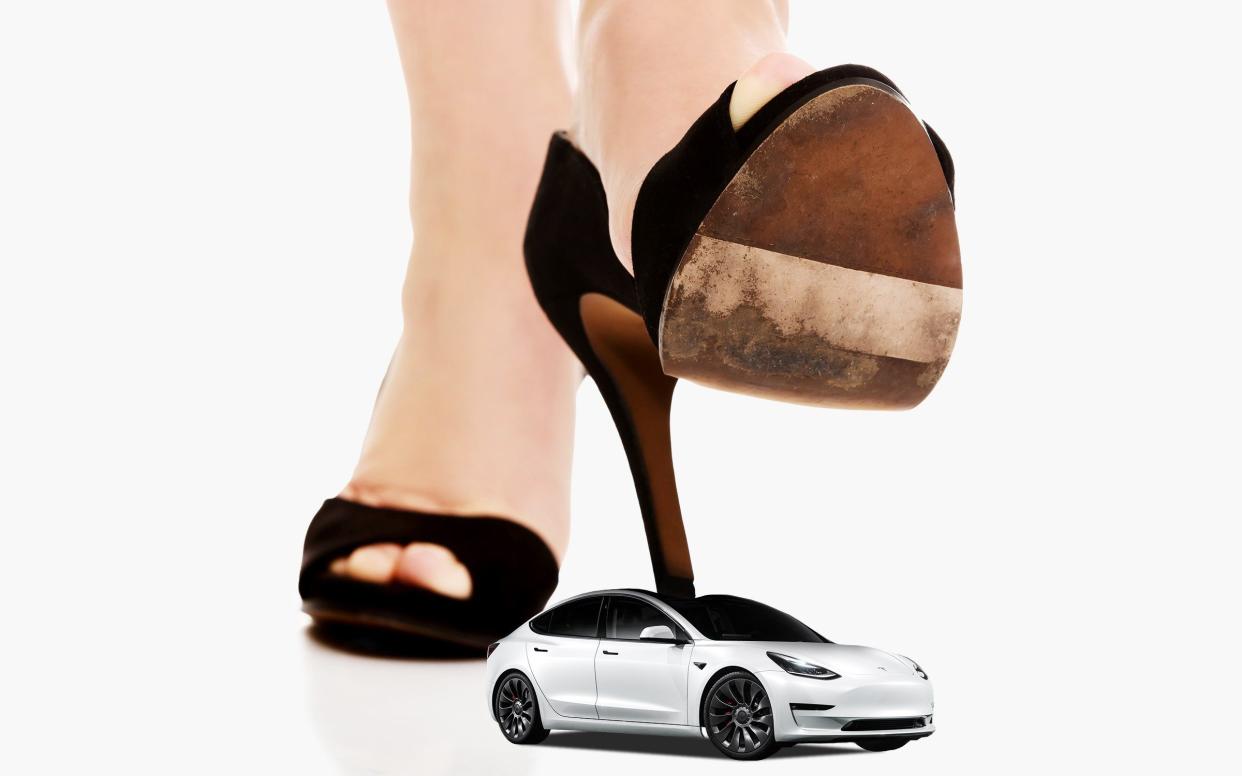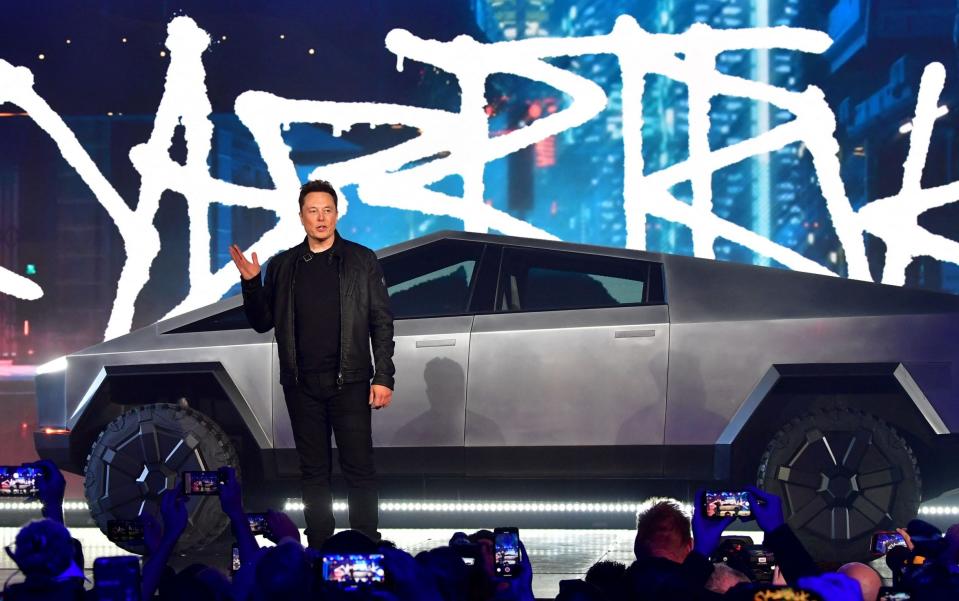‘Women feel even more left behind’: How electric cars drove a gender divide

The car industry’s “woman problem” has long been a subject of criticism, from macho advertising to the lack of female-shaped crash-test dummies.
It was hoped that the dawn of electric vehicles (EVs) might offer a useful moment to turn the page – but on current trends, electric car cheerleaders risk being disappointed.
Worrying research by online dealer Auto Trader shows the problem is getting worse, not better.
“We imagined there was going to be this great moment for some of that gender imbalance we’ve seen in the past to be redressed with EVs,” says Catherine Faiers, chief operating officer of Auto Trader.
“Slightly depressingly, we have found the exact reverse. Women feel even more left behind by the EV transition and find it even more daunting.
“That’s due to a combination of a lack of confidence, very technical language being used and horror stories they’ve read about. So this is a real challenge for the industry.”
Male-orientated marketing has long been an issue for carmakers, despite progress in recent decades. Elon Musk was criticised for what was regarded as the highly masculine design of Tesla’s Cybertruck – an angular, shiny beast of a vehicle that he boasted was big enough to “mount a missile launcher”.
Research by advertising agency CPB (now Forsman & Bodenfors) last year found that half of women still felt the automotive industry didn’t understand them, with eight in 10 unable to name any brand that did a good job of communicating with them.
“Think of the hypermasculinity that dominates so much car advertising – all moody mountainscapes and powerful machines dramatically conquering icy roads,” wrote Helen James, chief executive of Forsman & Bodenfors, for an article in MarketingWeek.
Yet there’s no inherent reason that women should be any less interested in EVs, Auto Trader’s Faiers points out, given that they hold half of all UK driving licences.
Despite this, a survey of 4,000 drivers last year and more recent focus groups by Auto Trader found evidence that women were less confident about making the switch to electric than men.

Part of this comes down to views about the whole car-buying process, which was disliked by one in two women.
Many aren’t as excited as men by the research phase, either, Auto Trader said, partly because there’s a lack of comprehensive motoring coverage in many lifestyle magazines aimed at women.
One female survey respondent said: “I find websites dedicated to cars really quite overwhelming. They are heavy on the information, difficult to read and filled with jargon.”
There was also low trust in dealerships, where some women felt they would be pressured into making a purchase they weren’t sure about.
Yet the strongest push factor came from a worry about EVs that is common to both sexes: range anxiety. Women are even more concerned about this than men, Auto Trader’s study found.
“Women are much more likely to be doing high-dependency journeys, where they’ve got other people such as kids, family and friends in the car,” Faiers says.
“So actually, the fear of running out of charge or the fear of tech not working is really amplified for them in that buying journey.”
For example, whereas 39pc of men agreed an EV “might not be charged when I need it” this rose to 49pc among women.
Auto Trader said this likely reflects the outsized role many women still play in the home, taking on more childcare duties, organisation of family calendars and chores than their male counterparts on average.
Despite modern progress towards sex equality, some 63pc of women told the British Social Attitudes Survey that they still did more housework than their male partners last year.
Many are shouldering the lion’s share of chores such as childcare and cooking duties on top of work commitments, a situation described as a “second shift” by social scientists.
This comes through in Auto Trader’s research, with women in focus groups expressing concerns that something could go wrong with their EV at a vital moment.
“There was a fear that came through really strongly: What if I need to take my child to hospital, or my dad’s ill and I’ve got to do something?,” says Marc Palmer, head of insights at the company.
“These are things they wouldn’t ordinarily say about petrol or diesel cars and it’s really holding them back in making a switch.”
In the survey last year, one female respondent said: “I can’t help worrying about what might happen if I forget. I might end up stranded in an emergency.”
Another gave a more specific example: “Our youngest daughter has health issues. We need to know we can get in the car and go to the hospital quickly. It would be a disaster if we had an EV and it hasn’t charged properly.”
Women also shared concerns with men about whether there were enough public charge points, while worrying more about issues of safety.
“Sometimes charge points are poorly lit or tucked away in the background,” says Palmer.
While 53pc of men said they felt safe using public charge points, only 43pc of women said the same. Over-55s were the most concerned, with only 33pc agreeing they felt safe doing so.
Meanwhile, the disparity in housework duties translated to another concern: some women felt that buying an EV would simply add more work – such as keeping it charged – to their already-long list, says Auto Trader.
“This is just another thing to worry about that I know will fall to me,” one female survey respondent said.
However, Auto Trader also found that once women tried EVs and purchased them they became much more positive. Many highlighted the savings they made on fuel, the quieter ride and the modern technology.
This was particularly the case after they went on test drives, despite a reluctance among some to do so.
Not having to visit petrol stations was also cited as a bonus by one third of women.
“I think [the concerns] are down to misunderstandings rather than women not liking EVs,” says Fiona Howarth, chief executive of Octopus EV, which offers electric cars on lease.
“Electric vehicles are fantastic for women. Women are often the quiet decision-makers at home, so they’re likely to be the buyers and the budgeters – they’re almost twice as likely as men to take charge of household budget.
“So actually, things like being able to run the car on a fraction of the cost of their petrol car is a really attractive benefit.
“And any working mum will tell you she wants a few extra minutes back in her day, so the convenience of not having to go to a petrol station and fill up a car is a great win – because the car will just fill up while you’re spending time with your kids or doing some of the other things you’ve got to do.”
To improve female attitudes to EVs, carmakers should focus on what women who drive them actually find they like, says Auto Trader.
That means showcasing them in more places, including women’s magazines, hammering home the message about cost savings, encouraging women to go on test drives and making home charger installations as easy as possible.
“It is a massive technology shift and you have to reverse all of your thinking around how you use the car, how you fuel the car, how you pay for the car,” says Faiers at Auto Trader.
“And the industry has effectively carried on using all of the old highly technical language.
“This is a moment where we should be changing the game.”
